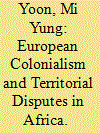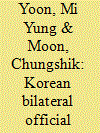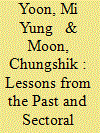| Srl | Item |
| 1 |
ID:
088404


|
|
|
|
|
| Publication |
2009.
|
| Summary/Abstract |
This essay examines how European colonialism continues to underlie most territorial disputes in Africa. How these disputes have been resolved or are likely to be resolved is described, based on the following four long drawn-out disputes: the Nigeria-Cameroon dispute over the Bakassi Peninsula; the Gabon-Equatorial Guinea dispute over the islands of Mbanié, Cocotiers, and Conga in the Corisco Bay; the Mauritius-United Kingdom dispute over the Chagos Archipelago; and the Comoros-France dispute over Mayotte.
|
|
|
|
|
|
|
|
|
|
|
|
|
|
|
|
| 2 |
ID:
132740


|
|
|
|
|
| Publication |
2014.
|
| Summary/Abstract |
In the past several years, the Republic of Korea-a former least developed country (LDC) and aid recipient that became a donor-joined the "club of emerging donors" to Africa. In March 2006, President Roh Moohyun declared Korea's Initiative for Africa's Development. The initiative puts poverty reduction and socioeconomic development of African countries in the forefront. Using pooled cross-sectional time series data, in this study we examine the determinants of Korean bilateral official development assistance (ODA) to Africa for the period 1991-2011. The findings of the study suggest that the approach of Korean ODA does not differ significantly from that of many conventional donors whose ODA disbursement has had a dual purpose: to improve the welfare of developing countries and to serve self-interests.
|
|
|
|
|
|
|
|
|
|
|
|
|
|
|
|
| 3 |
ID:
185980


|
|
|
|
|
| Summary/Abstract |
As a donor, the Republic of Korea emphasizes five sectors as primary targets for official development assistance—education, health, governance, agriculture, and industry and energy—which contributed to its own rapid economic growth; that is, the country uses its own development experience as a development assistance model. This study examines the determinants of Korean ODA allocation for each of these sectors. We hypothesize that Korea is likely to allocate more targeted ODA to countries with less achievement in these sectors, and that this tendency is stronger for low-income countries. Using disaggregated Korean ODA allocation data for 2006 to 2015, we find that while the income of recipient countries generally has a significant effect on the allocation of ODA to each sector, the level of development of that particular sector does not appear to have systematic effects on allocations. This null finding may be due to the lack of coordination among the country’s many ODA institutions and the alignment of ODA with the demands and preferences of the recipient countries.
|
|
|
|
|
|
|
|
|
|
|
|
|
|
|
|
| 4 |
ID:
159555


|
|
|
|
|
| Summary/Abstract |
Tanzania and Uganda are among the most cited countries employing reserved-seat quotas. They adopted these quotas in 1985 and 1989, respectively. However, the two countries use different mechanisms to recruit reserved-seat members of parliament (MPs). Drawing on interview data from Tanzania and Uganda, this study compares the two models in terms of their effectiveness in facilitating the transfer of female MPs to non-quota seats in subsequent elections, thereby furthering women's sustainable representation. We find that the Tanzanian model is superior because it compartmentalises quota MPs in reserved seats less than the Ugandan model. The Ugandan model creates a gendered perception that constituency seats are for males and quota seats are for females – as if each sex has a distinct category of parliamentary seats. This perception affects each step of the switch to a non-quota seat, from the decision to switch to party nominations to voters’ decisions at the polls.
|
|
|
|
|
|
|
|
|
|
|
|
|
|
|
|